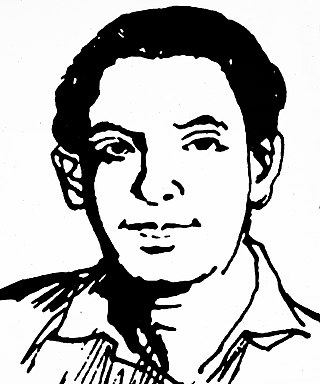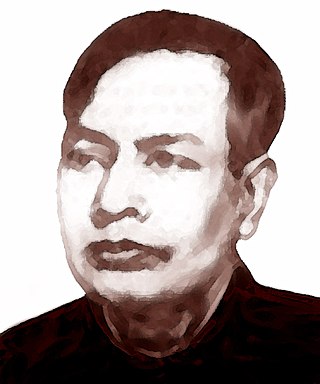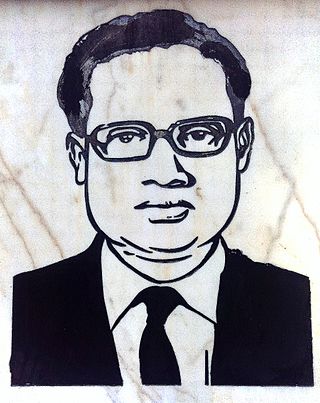Related Research Articles
Mohammad Zahirullah, known as Zahir Raihan, was a Bangladeshi novelist, writer and filmmaker. He is most notable for his documentary Stop Genocide (1971), made during the Bangladesh Liberation War. He was posthumously awarded Ekushey Padak in 1977 and Independence Day Award in 1992 by the Government of Bangladesh.

Abu Sayeed Chowdhury was a jurist and the second president of Bangladesh. Besides that, he held the positions of the Chairman of the United Nations Commission on Human rights, the vice-chancellor of the University of Dhaka, the Foreign Minister of Bangladesh and the first Bangladesh High Commissioner to the UK.

Govt. Brojomohun College, Barishal, commonly known as BM College, is one of the oldest institutions of higher education in Bangladesh. It is located in the city of Barishal in south-western Bangladesh.

Mohammad Shamsuzzoha was a Bengali writer, professor and proctor at Rajshahi University. Shamsuzzoha was the first university teacher in erstwhile East Pakistan who was killed by the Pakistani Military forces at the eve of 1969 revolution movement of East Pakistan, which ultimately became the Bangladesh Liberation War. In 2008, he was awarded the Independence Day Award.
Muhammed Abul ManzurBU was a Bangladeshi military officer who commanded the Bangladesh Forces operations in Sector 8 during the Bangladesh Liberation War against Pakistan in 1971. He was allegedly involved in the assassination of the then-president of Bangladesh, Ziaur Rahman. The erstwhile chief of army staff and alleged mastermind of Rahman's assassination, Hussain Muhammad Ershad, had put a standing shoot-to-kill order on Manzur's life—he was killed shortly after being captured at the border. About a year later, Ershad initiated a bloodless coup d'état and took over the central government, holding power until 1990.
Mufazzal Haider Chaudhury was a prominent Bengali essayist, prized scholar of Bengali literature, educator and linguist of the Bengali language.

1971 Dhaka University massacre was the mass murder of students and faculty at the University of Dhaka in East Pakistan by the Pakistan Army, at the beginning of what would become the Bangladesh Liberation War. In March 1971, the Pakistan Army Eastern Wing Commander Tikka Khan launched Operation Searchlight on the orders of dictator Yahya Khan to crush the Bengali nationalist movement. As part of the operation, the army launched an assault on the university campus. It is the deadliest university attack in history.

Jyotirmoy Guhathakurta was a Bengali educator and humanist of the former East Pakistan, now Bangladesh. He was one of the Bengali intellectuals killed by the Pakistan Army during the 1971 Dhaka University massacre on the night of 25 March 1971.
A.N.M NuruzzamanBir Uttom was a Bangladeshi army officer, who was also a sector commander in the Bangladeshi War of Liberation. After the war he served as the first and only director general of the paramilitary force Jatiya Rakkhi Bahini.
Sukharanjan Samaddar was a university professor, educationalist, and martyred freedom fighter of the Bangladesh Liberation War. Not to be confused with Sukha Ranjan Samadder, Professor at the department of Environmental Science and Engineering at Indian Institute of Technology (ISM), Dhanbad, India.

Kosiruddin Talukder (1899-1971) was a Pakistani medical doctor and politician who died in the Bangladesh Liberation war and is considered as martyr intellectual of 1971.

Shamsuddin Ahmed was an East Pakistan medical doctor who was killed in the Bangladesh Liberation war and considered a martyr in Bangladesh.
Muhammad Habibur Rahman was a Bengali intellectual who was killed in the Bangladesh Liberation war and is considered a martyr in Bangladesh.
Mir Abdul Qayyum was a Bangladeshi psychologist who was killed in the Bangladesh Liberation war and is considered a martyr in Bangladesh.
Muhammad Shafi (1915-1971) was a Bangladeshi surgeon who was killed in the Bangladesh Liberation war. Shafi is considered a "Martyr" in Bangladesh.
Mohammad Moazzem Hossain is a Bangladeshi educationist who was killed in the Bangladesh Liberation war by Razakars. He is considered a martyr in Bangladesh.

Quazi Sazzad Ali Zahir is a veteran of the Bangladesh Liberation War. The Bangladesh government awarded him the Bir Protik gallantary award for his bravery in the war. He was conferred with the Independence Award, Bangladesh's highest civilian in 2013 and India's fourth highest civilian award the Padma Shri on November 9, 2021.
Mohammad Ziauddin, BU is a retired Bangladeshi military officer, who was the Commanding Officer of the 1st East Bengal Regiment during the Bangladesh Liberation War. He was awarded the Bir Uttom, the country's second highest gallantry award for his outstanding bravery in the Liberation War. His certificate number was 22.
Meghna Guhathakurta is a retired professor of international relations of the University of Dhaka. She is the executive director of Research Initiatives, Bangladesh. She is a member of the executive committee of the Ain o Salish Kendra. She is a member of the advisory panel of the Interdisciplinary Institute of Human Security & Governance.
A. N. M. Muniruzzaman is a retired major general of Bangladesh Army, and president of the Bangladesh Institute of Peace & Security Studies. He is the chairperson of the Global Military Advisory Council on Climate Change. He was the Director General of the Bangladesh Institute of International and Strategic Studies.
References
- ↑ Rahman, Syedur (2010). Historical Dictionary of Bangladesh. Scarecrow Press. p. 196. ISBN 9780810874534 . Retrieved 15 August 2017.
- 1 2 3 Hossain, Abu Md. Delwar. "Muniruzzaman, ANM". Banglapedia. Retrieved 15 August 2017.